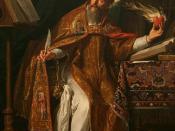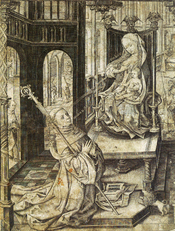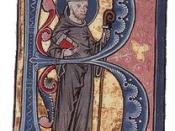The term 'Middle Ages' was invented by people during the Renaissance, a period of cultural and literary change in the 14th, 15th, and 16th centuries.
Most intellectual development took place inside of the church. This is only natural, as the church was the repository for most learning. Although nearly all of the nobility had an education, those who were educated, usually were tutored by clergy. The church became the universal and unifying institution.
Under the auspices of the church, education was modelled on the teachings of Saint Augustine. The teacher's role was to help the student seek inner truth, that is to say divine knowledge, through questioning. But at the same time, the student were considered to be in a sinful state full of evil inclinations and to be concealed through education. Thus the Augustinian formation went hand in hand with a despotic system of teaching.
The inspiration for these ideals were the "Church Fathers," such as St.
Augustine and St. Jerome, of classical times. Many colleges stuck to particular topics, such as theology, or metaphysics, or mathematics & geometry. Others reached out to embrace all topics, & these became known as "universities."
The first universities were founded in the 13th century. Theology and the arts, law, and logic and theology were taught at Paris, Bologna and Oxford respectively. Oxford's masters, Grosseteste and Roger Bacon, laid the foundations of a renewed conception of knowledge. Grosseteste invented the optical lens, while Bacon devoted himself to linguistics. Apart from demonstrating that mathematics was indispensable for understanding nature, they paved the way for experimental science.
Not all learning went on in the city schools, and not all of the important scholars taught at universities. Other 12th-century centers of learning were the monasteries, most of which were out in the countryside. Many respected...


